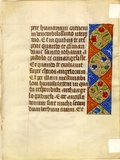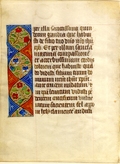Kent State University Leaf 47
This leaf is from a Book of Hours made in the area of the Netherlands in the late fifteenth century. It measures 18 x 13 cm. The borders on these leaves come in two forms. Some are composed of a firmly-defined rectangle filled to its edge with solid color (dominated by cinnamon, deep sky blue, and gold) rendered in a decorative conceit (triangles, waves, bars) and framing simple flower sprigs. Other borders are less boldly outlined and are not filled with solid colors; instead, a speckled background hosts a strong acanthus vine and a wildflower spray in which a live creature (a bird, a human, a zoomorph) may lurk. While this leaf may have been created in the Netherlands, its rubricated headings are in French. See Denison University Leaf 47 for more information about this manuscript.
Text: This leaf contains text from the prayer "Obsecro te" (I beseech thee), usually found in a Book of Hours after the Gospel readings and before the Hours of the Virgin. The translation is by Michael Martin, from http://www.preces-latinae.org/thesaurus/BVM/ObsecroTe.php. Kent Leaf 47 Recto
Kent Leaf 47 Recto
Kent State University Leaf 47 Recto
 Kent Leaf 47 Recto Transcription
Kent Leaf 47 Recto Transcription
-pere humanam carnem in venerabilissimo utero tuo. Et in quibus te respexit quando te commendavit sancto iohanni apostolo et evangeliste. Et quando te exaltavit super choros angelorum. Et per illam inestimabilem humilitatem in qua tu respondisti archangelo gabrieli. Ecce ancilla domini: fiat michi secundum verbum tuum. Et
 Kent Leaf 47 Recto Translation
Kent Leaf 47 Recto Translation
...to accept human flesh in thy most venerable womb and which He saw in thee when He commended thee to St. John the apostle and evangelist, and when He exalted thee over the choirs of angels, and through that holy ineffable humility with which thou didst respond to the Archangel Gabriel, "Behold the handmaid of the Lord. Be it done according to thy word." And...
 Kent Leaf 47 Verso
Kent Leaf 47 Verso
Kent State University Leaf 47 Verso
 Kent Leaf 47 Verso Transcription
Kent Leaf 47 Verso Transcription
per illa sanctissima quindecim gaudia que habuisti de filio tuo domino nostro ihesu xpristo. Et per illam sanctam maximam compassionem et accerbissimum cordis dolorem quem habuisti quando vidisti filium tuum dominum nostrum iesum xpristum ante crucem nudatum et in ipsam levatum vidisti pendentem crucifixum vulneratum sicientem fel apponi hely clamantem audisti
 Kent Leaf 47 Verso Translation
Kent Leaf 47 Verso Translation
...I beseech thee through those most holy fifteen joys that thou didst have in thy Son, our Lord Jesus Christ, and through that holy, great compassion and most bitter sorrow thou didst have when thou didst see our Lord Jesus Christ nude, lifted upon the cross, hanging, crucified, wounded, thirsty, served gall, heard Him cry out Eli...